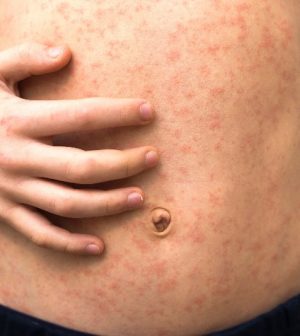- Could Your Grocery Store Meat Be Causing Recurring UTIs?
- Are You Making This Expensive Thermostat Error This Winter?
- Recognizing the Signs of Hypothyroidism
- 10 Strategies to Overcome Insomnia
- Could Artificial Sweeteners Be Aging the Brain Faster?
- Techniques for Soothing Your Nervous System
- Does the Water in Your House Smell Funny? Here’s Why
- Can a Daily Dose of Apple Cider Vinegar Actually Aid Weight Loss?
- 6 Health Beverages That Can Actually Spike Your Blood Sugar
- Treatment Options for Social Anxiety Disorder
What Is Measles, and How Can I Shield Myself & My Family?

Once thought to be a bygone disease, measles is making a comeback in the United States and globally as folks shun a safe, surefire way to prevent it: The measles vaccine.
But what is measles, and how easily does it spread? Drs. Aaron Milstone and Lisa Lockherd Maragakis, two infectious disease experts at Johns Hopkins Medicine in Baltimore, provide answers to your common measles questions.
What is measles? How easily can it spread?
Measles is a viral illness that’s one of the most easily transmitted infections known to medicine. “Nine out of 10 un-immunized children who are in contact with an infected person will contract the virus,” the Hopkins experts wrote, and “the virus can linger in the air for about two hours after a person with measles has left the room.”
How serious a disease is it?
Many people may believe that measles is just an uncomfortable but transient illness, but the truth is that it can prove very severe — especially for kids.
Even in its “uncomfortable” form, measles is not easy, Milstone and Maragakis said.
Besides the hallmark rash, which begins on the face and can cover the body, measles can involve high fever, cough, conjunctivitis (red, runny eyes) and congestion.
Without complications, measles typically runs its course in a week. When complications do arise, things can get much worse, however.
Complications “can include ear infections, pneumonia and encephalitis, or inflammation of the brain, that can lead to permanent neurologic damage and even death,” the two doctors wrote. “On average, measles kills between one and three of every 1,000 infected children.”
Prevention is easy: Vaccination
The measles vaccine is one of the most effective known to medicine: 95% effective after one dose and 99% effective after two doses, the experts said.
Currently, the measles vaccine is recommended for all children. The first dose should be given between the ages of 12 and 15 months, and the second between the ages of 4 and 6. If you plan to take your kids to an area where measles is a risk, the second dose can come as soon as a month after the first dose, the Hopkins experts added.
The vaccine is deemed to be less effective for babies between 6 months and one year of age, so any baby who receives their first shot that young should get two more boosters.
Is the measles vaccine safe?
Don’t believe internet rumors: The measles vaccine has a long track record of safety, Milstone and Maragakis said.
First of all, “scientific research has shown unequivocally that the measles vaccine does NOT cause autism or other permanent neurologic or developmental problems,” the two experts wrote.
The measles vaccine is made with a live but weakened form of the measles virus. As with any vaccine of this type, rare side effects can occur.
“Some children — about 10 percent — will develop a fever about six to 12 days after vaccination, and an even smaller percentage will have a rash that can last a few hours to a day or two,” the experts said. “In extremely rare cases, the fever can precipitate a seizure in children predisposed to fever-induced seizures.”
In typical kids with healthy immune systems, getting the vaccine will not trigger measles-like illness. For children with weakened immune systems vaccination could spur such illness, so “if the immune deficiency is diagnosed in time, these children should not be vaccinated,” Milstone and Maragakis advised.
Protecting your child – and others
Most children will not have any vaccine side effects, however, and getting vaccinated can spare them a potentially severe illness.
Getting vaccinated shields others, too.
“Because infants and a small number of other people cannot receive the vaccine, it is critically important that the rest of the population be vaccinated to prevent outbreaks and spread of the disease,” the Hopkins experts said.
SOURCE: Johns Hopkins Medicine
Source: HealthDay
Copyright © 2026 HealthDay. All rights reserved.










